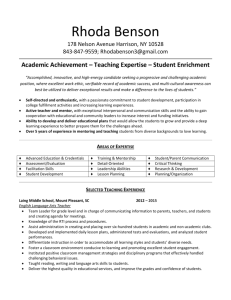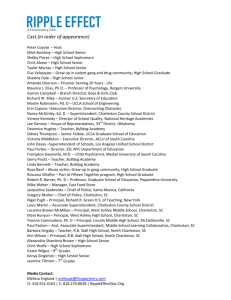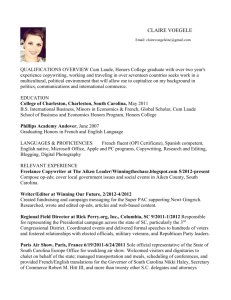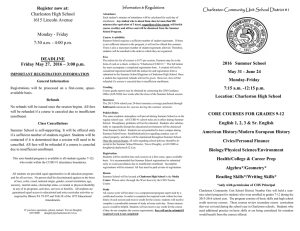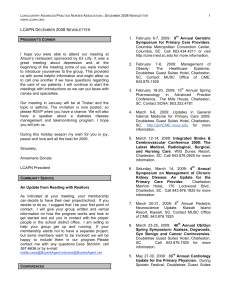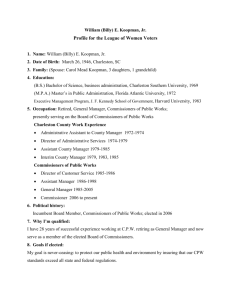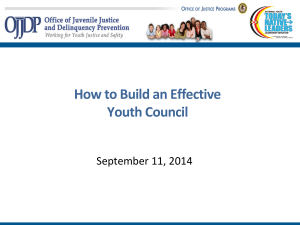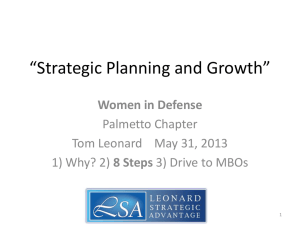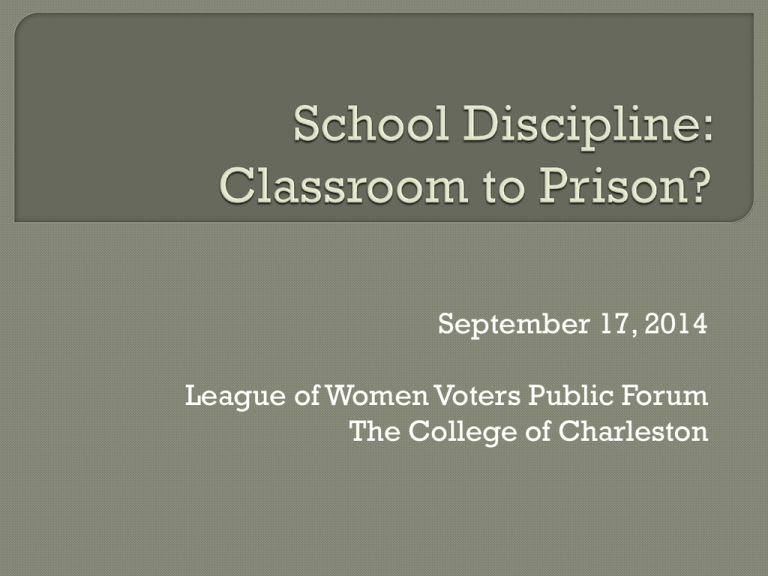
September 17, 2014
League of Women Voters Public Forum
The College of Charleston
“Its most basic meaning suggests that schools
communicate with police about student misconduct
in a way that leads students to develop arrest records
and eventually serve time in prison. But the term is
also used to refer to a more subtle and more common
chain of events: students are repeatedly suspended,
fail academically, and have their social, emotional,
and educational needs unmet by the school; they
withdraw from school or are expelled; and this
school failure or withdrawal substantially increases
the risk that they become ensnared in the criminal
justice system” (Kupchik 2014: 96-97).
Widespread
externalization of students
Disparate Impact
• Race
• Students with disabilities
• LGBT youth (Himmelstein and Bruckner 2011)
Caution:
• Pursuing the Silver Bullet
• Privileging schools
Internalization to Externalization
War on Youth
• Warnings of “Super-Predators” (90s)
Diminished Discretion in Justice Systems
• From Mandatory Minimums and Three Strikes to Zero-tolerance
policies in Schools
Incarceration—the best idea we’ve had
Widening the Net:
• “Disturbing School” in SC
Politics of policy and ignorance of evidence-based research
Expanded adoption of CJ “logics” (Kupchik 2014)
• “Militarization” of police and schools
• “Broken Windows”
School Resource Officers (SROs) (Na and Gottfredson 2011)
Source: U.S. Department of Education Office for Civil Rights. 2014
Source: Charleston County School District 2014
Source: Charleston County School District 2014
Source: SCDJJ 2013.
January
8, 2014: “Dear Colleague” Letter
June 3, 2014: School Discipline
Consensus Report (Council of State
Governments Justice Center)
Commitments to reform in CA and TX
Charleston County School District
Charleston County School District. 2014. Report of Student Suspensions,
Expulsions and Attendance, 2012-2013. Retrieved 9/4/2014
http://www.ccsdschools.com/Academic/AchievementAccountability/Ass
essmentEvaluation/ReportsStatistics/index.php
Patrick Griffin, Sean Addie, Benjamin Adams, and Kathy Firestine. 2011.
Trying Juveniles as Adults: An Analysis of State Transfer Laws and Reporting.
Washington DC: OJJDP.
Kathryn Himmelstein and Hannah Bruckner. 2011. “Criminal Justice and
School Sanctions Against Nonheterosexual Youth.” Pediatrics 127 1: 49-57
Paul Hirschfield. 2012. “A Critical Assessment of Theory and Research on
the ‘School to Prison Pipeline.’” Paper presented at the American Society
of Criminology Annual Conference, Chicago, IL, Nov. 14-17, 2012.
Jacob Kang-Brown, Jennifer Trone, Jennifer Fratello and Tarika DaftaryKapur. 2013. A Generation Later: What We’ve Learned about Zero Tolerance
in Schools. New York: VERA Institute of Justice.
Aaron Kupchik. 2014. “The School-to-Prison Pipeline: Rhetoric and
Reality.” Pp. 94-119 in Franklin E. Zimring and David S. Tanenhaus (eds.)
Choosing the Future for American Juvenile Justice. New York: New York
University Press.
Chongmin Na and Denise C. Gottfredson. 2013. “Police Officers in
Schools: Effects on School Crime and the Processing of Offending
Behaviors.” Justice Quarterly 30: 619-650.
Charles Puzzanchera. 2013. Juvenile Arrests 2011. Washington DC: OJJDP.
Charles Puzzanchera and Sean Addie. 2014. Delinquency Cases Waived to
Criminal Court, 2010. Washington DC: OJJDP.
SCDJJ. 2013. Annual Statistical Report. Columbia, SC: SC Department of
Juvenile Justice.
U.S. Department of Education Office for Civil Rights. 2014. Data Snapshot:
School Discipline. Washington DC: U.S. Department of Education Office for
Civil Rights.
U.S. Department of Justice and U.S. Department of Education. 2014. “Notice
of Language Assistance Dear Colleague Letter on the Nondiscriminatory
Administration of School Discipline.” Retrieved September 8, 2014
http://www2.ed.gov/about/offices/list/ocr/letters/colleague-201401title-vi.pdf


